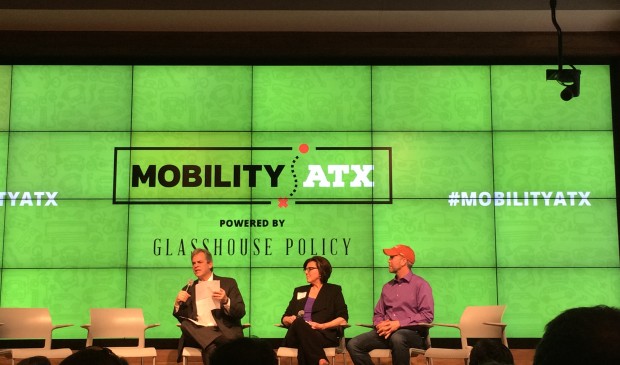City transit heads and private innovators share MobilityATX stage
Friday, June 26, 2015 by
Audrey McGlinchy, KUT A bunch of men, and one woman, gathered Tuesday night in the new Google Fiber building downtown to discuss Austin’s transportation future. With Mayor Steve Adler, Capital Metro President and CEO Linda Watson and transportation app RideScout CEO Joseph Kopser fielding most of the questions from audience members and the moderator, the night’s conversation circled the question of public-private partnerships when it comes to mending Austin’s travel woes.
“We need to make sure that Austin continues to become an ever smarter city and a more accurate reflection of the innovators and the entrepreneurs that call this city home,” said Adler.
Adler announced that the top idea floated during MobilityATX’s online forum, where residents could post transportation suggestions, was the city’s 2014 Bicycle Master Plan, approved by City Council in November 2014. But in the next sentence, Adler shared the plan’s price tag – $150 million – and how funding the master plan is going to be an issue.
“Right now the funding sources that exist are being focused on transit lanes and improvements that are being done on MoPac North and MoPac South,” Adler said, adding that the addition of Council members Ann Kitchen, Sheri Gallo and Delia Garza to the Transportation Policy Board of the Capital Area Metropolitan Planning Organization would help divert more money toward the needs of Austin.
“But it’s going to require a culture change in this city,” Adler added. He said a recent visit to Portland convinced him further that bicycling to get around is ingrained in residents of other cities in a way that it’s not in Austin.
Kopser defended local government before telling the audience how private companies, such as his own, could fill gaps left by Council. And he made a point of that right on stage – announcing that the downtown bus line of yore, the ‘Dillo, taken off-circuit by Capital Metro in 2009, would be making a comeback, now with funding from the private sector (Kopser’s own company, RideScout). But the service will be limited for now, with rides just through the summer and until 1 p.m. on weekdays.
“So I’m a big believer right now that the government, as it’s structured right now, is not necessarily tapped out, but it’s really busy and very distracted on a whole lot of issues,” said Kopser. “But we, the rest of us, we the people, we cannot wait, and the private sector – you are losing money. If you’re an employer and you have employees that are stuck in traffic or who show up to work mad and pissed off because of how bad the traffic is you are paying a price. So the private sector, we want to step forward quickly.”
Of course a transit system must serve its customers as they get from residential to office space and back again. And those areas of town are driven by land use, which is dictated by the city. For example, the fourth most popular idea for transit change on the MobilityATX site is to get rid of the sidewalk exemption, an ordinance that allows builders to pay a fee instead of constructing a sidewalk between their property and the road.
Adler said he thought more people were beginning to understand how land use and traffic go hand in hand, mentioning how the conversation at Council over accessory dwelling units, or ADUs, has changed over the last year, and that the process of upending the city’s code through CodeNEXT was a clear sign that residents had caught on to the idea that code is one mechanism for change.
“In fact, the consultants for that are in town as we are sitting here in these chairs,” said Adler. “So that conversation is moving forward.”
While Kopser seemed to agree, he added, “We have to be denser.”
Adler ticked off additional items as part of an overhaul of the way the city dictates its land use, including a refurbished permitting process. “This city is in transition right now,” said Adler. “At this moment, this city is in, I think, greater transition than anything I’ve seen in the short period of time, and I’ve been here for 37 years. And it’s welcome.”
You're a community leader
And we’re honored you look to us for serious, in-depth news. You know a strong community needs local and dedicated watchdog reporting. We’re here for you and that won’t change. Now will you take the powerful next step and support our nonprofit news organization?








